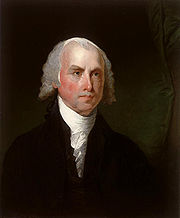
Federalist No. 38
Encyclopedia

James Madison
James Madison, Jr. was an American statesman and political theorist. He was the fourth President of the United States and is hailed as the “Father of the Constitution” for being the primary author of the United States Constitution and at first an opponent of, and then a key author of the United...
, the thirty-eighth of the Federalist Papers
Federalist Papers
The Federalist Papers are a series of 85 articles or essays promoting the ratification of the United States Constitution. Seventy-seven of the essays were published serially in The Independent Journal and The New York Packet between October 1787 and August 1788...
. It was published on January 12, 1788 under the pseudonym
Pseudonym
A pseudonym is a name that a person assumes for a particular purpose and that differs from his or her original orthonym...
Publius, the name under which all the Federalist Papers were published. Madison continues his topic from Federalist No. 37
Federalist No. 37
Federalist No. 37 is an essay by James Madison, the thirty-seventh of the Federalist Papers. It was published on January 11, 1788 under the pseudonym Publius, the name under which all the Federalist Papers were published. This paper discusses some of the political questions raised at the...
, the political questions examined by the constitutional convention
Philadelphia Convention
The Constitutional Convention took place from May 14 to September 17, 1787, in Philadelphia, Pennsylvania, to address problems in governing the United States of America, which had been operating under the Articles of Confederation following independence from...
. The essay is titled, "The Same Subject Continued, and the Incoherence of the Objections to the New Plan Exposed."
The essay notably underlines the progress made against slavery in the new Constitution: "It is a matter both of wonder and regret, that those who raise so many objections against the new Constitution should never call to mind the defects of that which is to be exchanged for it. It is not necessary that the former should be perfect; it is sufficient that the latter is more imperfect...Is the importation of slaves permitted by the new Constitution for twenty years? By the old it is permitted forever."

